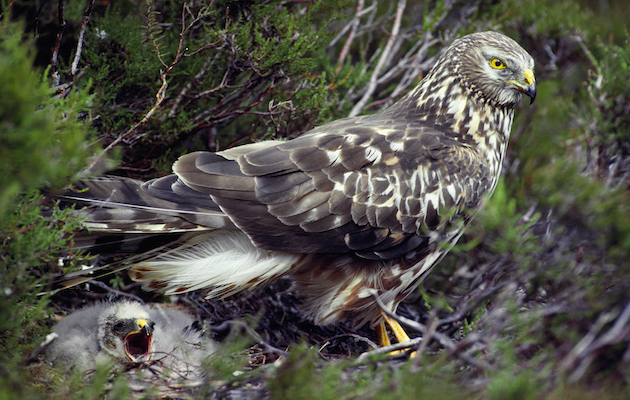2015 hen harrier breeding season set to be most successful since 2010
A report from Natural England shows an encouraging step forward

Hen harriers remain one of the most endangered breeding birds in England. Yet despite poor weather throughout the recent breeding season, 2015 has brought six successful harrier nests, fledging 18 new chicks.
Unfortunately a seventh nest failed towards the end of the season as a result of natural causes.
The successful nests are located across the north of England, in Northumberland, Lancashire, County Durham and north western England.
Achieved through a working partnership
A team from the Moorland Association, Natural England, Forestry Commission and RSPB joined forces with volunteer raptor workers, landowners and their staff to achieve this encouraging result.
Rob Cooke of Natural England commented: “Six nests is a small number, but it is actually more than we have seen in total over the past three years – which is a significant and positive step forward. Obviously we need to see many more pairs of these iconic birds nesting successfully and we are actively looking at how we and our partners can build on this positive outcome in the future.”
The Moorland Association, which played a significant role in the outcome, spends £52.5 million annually on conservation. Chairman Robert Benson stated: “Grouse moor managers have played a significant role in protecting nests and this year’s success, which is very welcome. However we need to do more for hen harriers. With government help, via a Hen Harrier Action Plan, numbers and the spread of nests next year could be even better, buffering the effects of poor weather and predation.”
Tom Dearnley, Forestry Commission Ecologist said: “We are thrilled there have been two succesful hen harrier nests in Northumberland. We hope that this will mean many more succesful years for breeding hen harriers on land the Forestry Commission manages. This success highlights the habitat value to the species.”
The Forestry Commission’s public forest estate hosts a wide range of priority species which are covered by active management plans.
RSPB Board spokesman Stuart Housden stated: “Whilst we’re very pleased some hen harrier chicks have fledged successfully this year, we must recognise there remains a long way to go to secure the species’ future as a breeding species in England. Harriers are still absent from vast swathes of suitable habitat, and are highly vulnerable to illegal persecution. ”
An intensive Hen Harrier recovery project was carried out by Natural England and its predecessors between 2002 and 2008 and the report “A future for the hen harrier in England” provides a summary of the information gathered.








